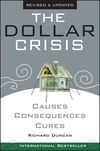Credit percentage of GDP - all time high of 340%
 Americans may be disappointed that the Federal Reserve's interest rate cut won't necessarily translate into lower monthly mortgage payments and a revival of the housing market. "Mortgage rates won't stimulate demand,'' said Scott Anderson, senior economist at Wells Fargo. "The Fed may be a little impotent here because what caused this housing crash was overpriced housing, not mortgages.''
Americans may be disappointed that the Federal Reserve's interest rate cut won't necessarily translate into lower monthly mortgage payments and a revival of the housing market. "Mortgage rates won't stimulate demand,'' said Scott Anderson, senior economist at Wells Fargo. "The Fed may be a little impotent here because what caused this housing crash was overpriced housing, not mortgages.''When trading in any overpriced asset-class slows dramatically, there's only one "cure." That cure is lower prices.
I just received and finished reading a paper by one of my favorite economists, Richard Duncan (he authored the terrific book, "The Dollar Crisis, Causes, Consequences, Cures"). Duncan is one of the very few people who fully understands what's going on in the US and world economies. Please study these two paragraphs carefully.
"Bubbles are easier to inflate than to sustain. The US property bubble is now beginning to deflate, and the risks to the US and the global economy are greater now than they were when the stock market crashed six years ago -- greater because the global imbalances have become so much larger as a result of the US property bubble. If US consumption now begins to contract, as appears likely, US imports will decline, and the world will also go into recession, possibly a very severe one.
"Credit growth drives economic growth. Total credit in the US as a percentage of GDP has grown from 150% in 1969 to 240% in 1990 to 340% today. It is not difficult to understand that rapid credit expansion boosts consumption and investment and employment and asset prices. However, excessive credit growth also eventually causes economic overheating and asset price bubbles. So long as additional credit is forthcoming everyone can simply borrow more this year to pay interest on the money they borrowed last year. Those bubbles pop when the individuals and/or corporations who borrowed the money are unable to pay it. That is the situation we are experiencing today."
Now the world bubble (due to a number of causes and triggered by the subprime disaster) is beginning to deflate. This has created an international credit crisis. If the world bubble continues to deflate, it's going to result in a global recession or worse. The only way to halt this deflation is for the US government to increase its ratio of debt to Gross Domestic Product (GDP). This will require the US to spend additional hundreds of billions of dollars -- maybe well over a trillion dollars to offset the deflationary forces of the credit contraction.
Richard Duncan believes that the US may have to spend a trillion dollars or more over the next four years just to stave off credit contraction and deflationary forces.
The question then arises, how can the US finance the huge amount of spending (debt) that must be created in order to offset the forces of deflation? The usual way would be to sell Treasury securities to our foreign friends and their central banks. But what if the central banks (already choking on US dollar-denominated securities) have accumulated enough dollars? In that case, the US will have to sell bonds to the Fed, and the Fed would create the money needed to finance the deficits.
But wouldn't this process be highly inflationary? Yes, of course it would -- basically, it's monetizing the debt, which is always inflationary. Yet increased inflation is what is needed to counteract the deflationary force of the deflating world bubble.
The question then arises, assuming deflation can be held off, how can the whole mess be solved in some permanent way in the future? The answer, I believe, is that the world must move to a new monetary system with an anchor in something tangible, an anchor that will force discipline. The only tangible item I can think of that will fit is gold.

3 Comments:
This comment has been removed by a blog administrator.
A trillion dollars!! I don't think US government is going invest that much money to recover this situation. But the US government really needs to "increase its ratio of debt to Gross Domestic Product (GDP)".
I cannot thank Mr Benjamin service enough and letting people know how grateful I am for all the assistance that you and your team staff have provided and I look forward to recommending friends and family should they need financial advice or assistance @ 1,9% Rate for Business Loan .Via Contact : . 247officedept@gmail.com. WhatsApp...+ 19893943740. Keep up the great work.
Thanks, Busarakham.
Post a Comment
<< Home